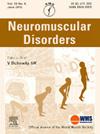Potential relationship between MuSK-MG and autologous hematopoietic stem cell transplantation: a case report
IF 2.7
4区 医学
Q2 CLINICAL NEUROLOGY
引用次数: 0
Abstract
A 61-year-old woman developed anti-muscle-specific tyrosine kinase antibody positive myasthenia gravis (MuSK-MG) three years after autologous hematopoietic stem cell transplantation (HSCT) for multiple myeloma. Symptoms improved following methylprednisolone pulse therapy, intravenous immunoglobulin, plasma exchange, and the addition of efgartigimod. A review of the literature revealed that all four previously reported cases of myasthenia gravis after autologous HSCT were MuSK-MG, although none were positive for anti-acetylcholine receptor (AChR) antibodies. This frequency differs significantly from the reported incidence of MuSK-MG in the general population and in patients following allogeneic HSCT, suggesting a potential association between autologous HSCT and MuSK-MG. Hypothesized mechanisms include a paraneoplastic mechanism and changes of IgG4 production following immune reconstitution after autologous HSCT. We suggest that clinicians should be aware of this possibility and consider MuSK-MG in the differential diagnosis of neurological symptoms that arise after autologous HSCT, even though autologous HSCT can be used as a therapeutic option for MuSK-MG.
麝香- mg与自体造血干细胞移植的潜在关系1例
一名61岁女性在多发性骨髓瘤自体造血干细胞移植(HSCT)三年后出现抗肌肉特异性酪氨酸激酶抗体阳性重症肌无力(MuSK-MG)。经甲强的松龙脉冲治疗、静脉注射免疫球蛋白、血浆置换和加用埃加替吉莫后,症状得到改善。文献回顾显示,所有4例自体造血干细胞移植后重症肌无力病例均为麝香- mg,尽管抗乙酰胆碱受体(AChR)抗体均未阳性。这一频率与报道的普通人群和同种异体造血干细胞移植患者中MuSK-MG的发病率有很大不同,这表明自体造血干细胞移植和MuSK-MG之间存在潜在的关联。假设的机制包括副肿瘤机制和自体造血干细胞移植后免疫重建后IgG4产生的变化。我们建议临床医生应该意识到这种可能性,并在自体HSCT后出现的神经系统症状的鉴别诊断中考虑麝香mg,即使自体HSCT可以作为麝香mg的治疗选择。
本文章由计算机程序翻译,如有差异,请以英文原文为准。
求助全文
约1分钟内获得全文
求助全文
来源期刊

Neuromuscular Disorders
医学-临床神经学
CiteScore
4.60
自引率
3.60%
发文量
543
审稿时长
53 days
期刊介绍:
This international, multidisciplinary journal covers all aspects of neuromuscular disorders in childhood and adult life (including the muscular dystrophies, spinal muscular atrophies, hereditary neuropathies, congenital myopathies, myasthenias, myotonic syndromes, metabolic myopathies and inflammatory myopathies).
The Editors welcome original articles from all areas of the field:
• Clinical aspects, such as new clinical entities, case studies of interest, treatment, management and rehabilitation (including biomechanics, orthotic design and surgery).
• Basic scientific studies of relevance to the clinical syndromes, including advances in the fields of molecular biology and genetics.
• Studies of animal models relevant to the human diseases.
The journal is aimed at a wide range of clinicians, pathologists, associated paramedical professionals and clinical and basic scientists with an interest in the study of neuromuscular disorders.
 求助内容:
求助内容: 应助结果提醒方式:
应助结果提醒方式:


